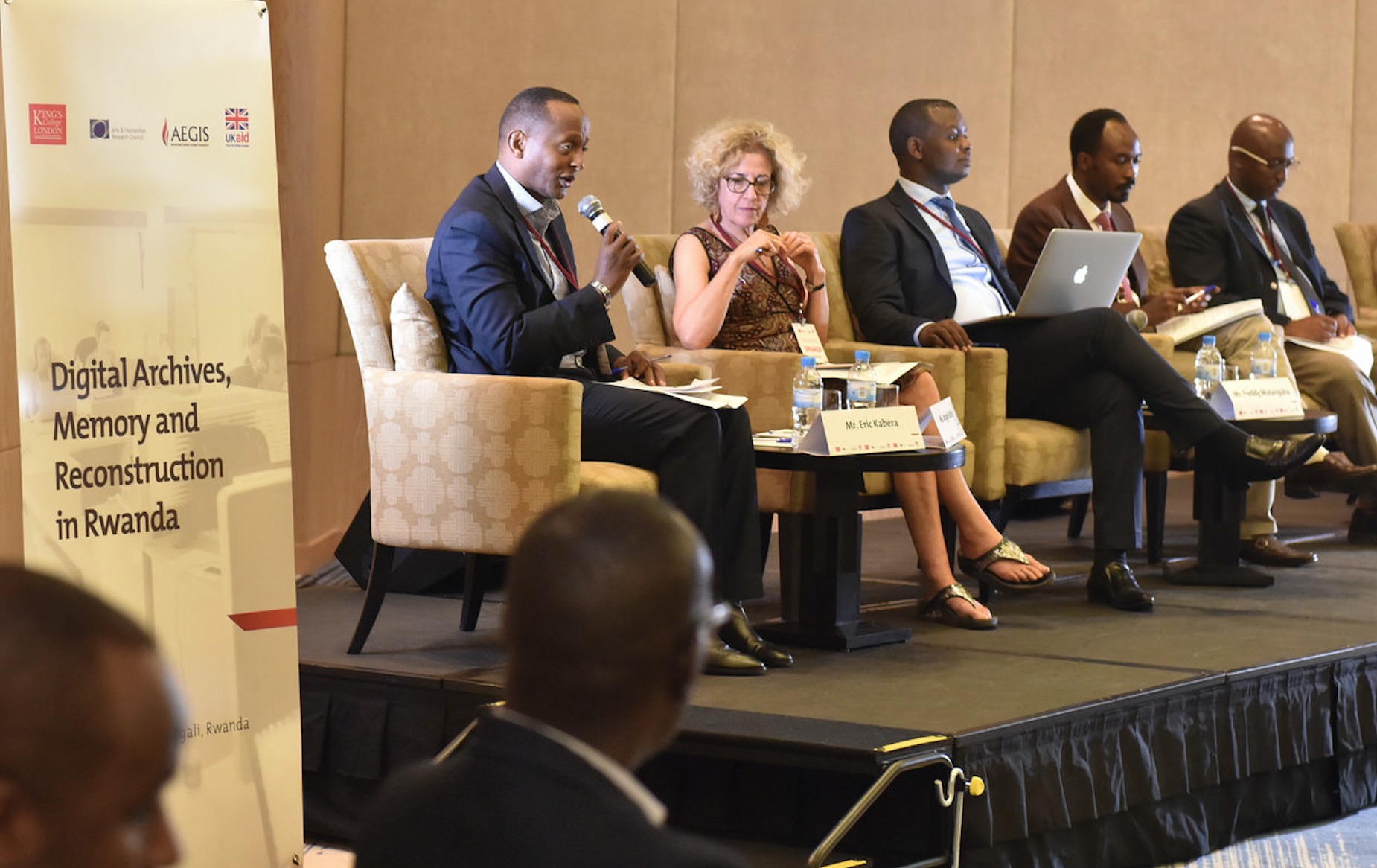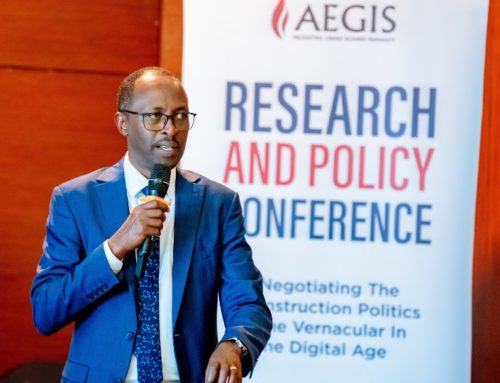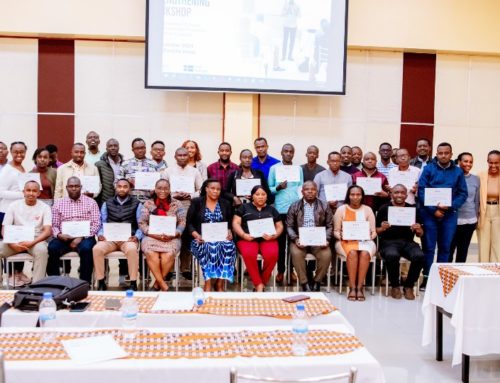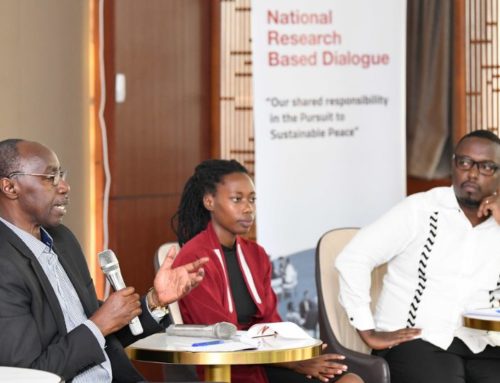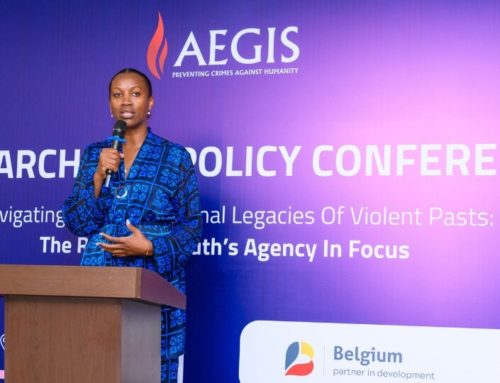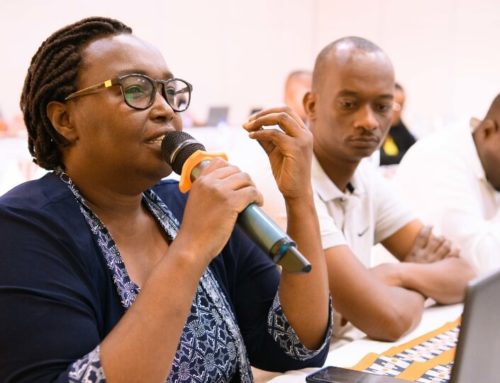The Digital Archives, Memory and Reconstruction in Rwanda conference, organised by the Aegis Trust in collaboration with the Department of Digital Humanities at King’s College London (KCL) is underway at the Marriot Hotel in Kigali. The first day of the three-day conference included four expert panels and two fascinating keynote speeches.
The conference has been made possible thanks to support from the UK Arts and Humanities Research Council.
The gathering begun with introductions from Freddy Mutanguha, Regional Director for Aegis, and Dr Mark Hedges, Senior Lecturer for the Department of Digital Humanities at KCL. Both provided a background on the partnership between Aegis and KCL, and the context of the digital archives project. They also outlined the goals of the conference and how it would be structured.
Learning from the UK National Holocaust Centre and Museum
Dr James Smith, CEO of the Aegis Trust, joined the conference over Skype from Nottinghamshire in the UK for the first keynote address. He gave a short presentation on the work of Aegis in the UK with regards to the National Holocaust Centre and Museum, leading a virtual tour of some parts of the centre, and playing short documentary videos to summarise its work.
Parallels were drawn between the virtualisation of the Rwandan archives and the Holocaust Centre’s work to create a virtual experience of the museum so that it is accessible to students around the world. In addition, Dr Smith made the point that there is a fast-approaching turning point in the way in which the Holocaust can be remembered, due to the rapidly diminishing number of living survivors. This, he said, made digitization of testimonies a vital exercise in memorialisation of an atrocity – and also makes the digitalisation drive in Rwanda so worthwhile.
Engaging Digital Natives
Jean Philbert Nsengimana, Minister for Youth and ICT, opened the conference and spoke about the necessity for digital modernisation given the extent to which the world has become reliant on technology. He stressed the importance of engaging with young people and connecting them with their history through digital technologies, especially archives.
“The information that is not digitised today is at great risk of being lost. Just look at how millennials use technology. Many of us are digital migrants. But the younger generation are digital natives. They look at the world as a big digital touch screen. Rwanda is in a good position to lead the way in using digital archiving as a tool for both remembrance and reconstruction.”
The Minister encouraged participants to think about how the country could embrace its digital potential.
Panel 1: Memory and Memorialisation
Participants: Dr Eric Ndushabandi (IRDP), Jerome Karangwa (Institute of National Museums) Arthur Asiimwe (Rwanda Broadcasting Agency) Olivier Mazimpaka (GAERG – Association of Former Student Survivors of the Genocide).
Moderator: Professor Sheila Anderson (King’s College London).
The first panel discussed memory and memorialisation in relation to digital matters. The panellists spoke about the importance of digitisation in the Rwandan context, the opportunities that it affords to students and researchers in Rwanda and how important it is to have both accessible and everlasting evidence of Rwanda’s history. The panellists, particularly Mr Ndushabandi and Mr Mazimpaka talked about the subtleties of obtaining evidence such as eyewitness testimonies, and the psychological impacts these may have.
Panel 2: Education and Peace Building
Participants: Eric Kabera (Kwetu Film Institute), Theogene Kayiranga (Well Spring Foundation), Nkubito Bakuramutsa (Ministry of Education), Angie Kotler (A Partner in Education) and Dr Joseph Nkurunziza (Never Again Rwanda).
Moderator: Freddy Mutanguha (Aegis Trust).
During the second panel, participants discussed the role that technology can play in peace building education. The panellists were in agreement on the potential and importance that digital tools have with regards to improving educational experiences, and the importance of making technology available throughout Rwandan educational facilities, not solely to help with remembrance, but to help improve the quality of education in the country.
Data Science and the Digital Economy
In the second keynote address of the day, Professor Patrick McSharry, Senior Lecturer at Carnegie Mellon University Africa, spoke on the subject of ‘Big Data’, and its potential uses in Rwanda. Professor McSharry detailed the benefits of open source content – publicly available Big Data – for all economies. The accessibility of national data provides opportunities for the government and the private sector, and the combining factors of great phone coverage, a young population and a high population density make Rwanda a particularly high-potential country for a vibrant data industry.
Panel 3: Social Justice and Inclusivity
Participants: Joseph Nkurunziza (Never Again Rwanda) and Dr Eric Ndushabandi (IRDP)
Moderator: Professor Sheila Anderson (King’s College London).
The panellists discussed the dynamics of Rwanda as a post-genocide society, and the challenges faced in terms of creating a united and inclusive society. The importance of civil society and democracy in developing unity, as well as the approach to dealing with the Genocide (in comparison to the aftermath of the Holocaust) were also evaluated.
Panel 4: Capacity Building and the Digital Economy
Participants: Eddy Kayihura (Bank of Kigali), Yves Kamuronsi (Aegis Trust) and Robert Ford (ICT Chamber).
Moderator: Dr Mark Hedges (King’s Colledge London).
The focus of the final panel of the day was on expanding digital economy in Rwanda.
Panellists spoke about strategies to increase the levels of digital innovation and stimulate business growth, such as through improved infrastructure, ‘Big Data’ and grassroots investment. The kLab programme for young Rwandan app developers was cited as an example of building capacity in Rwanda for more digital growth.

